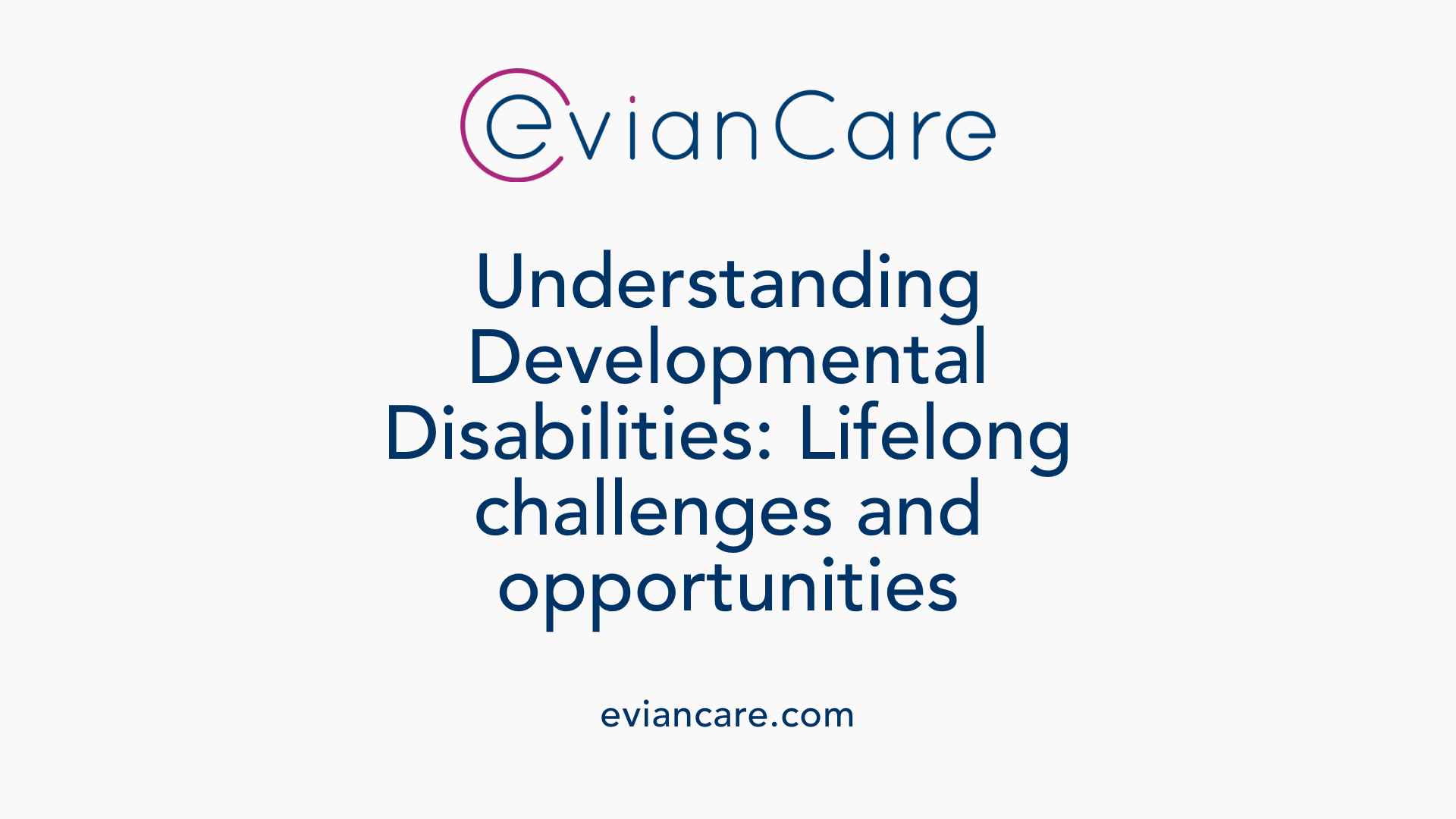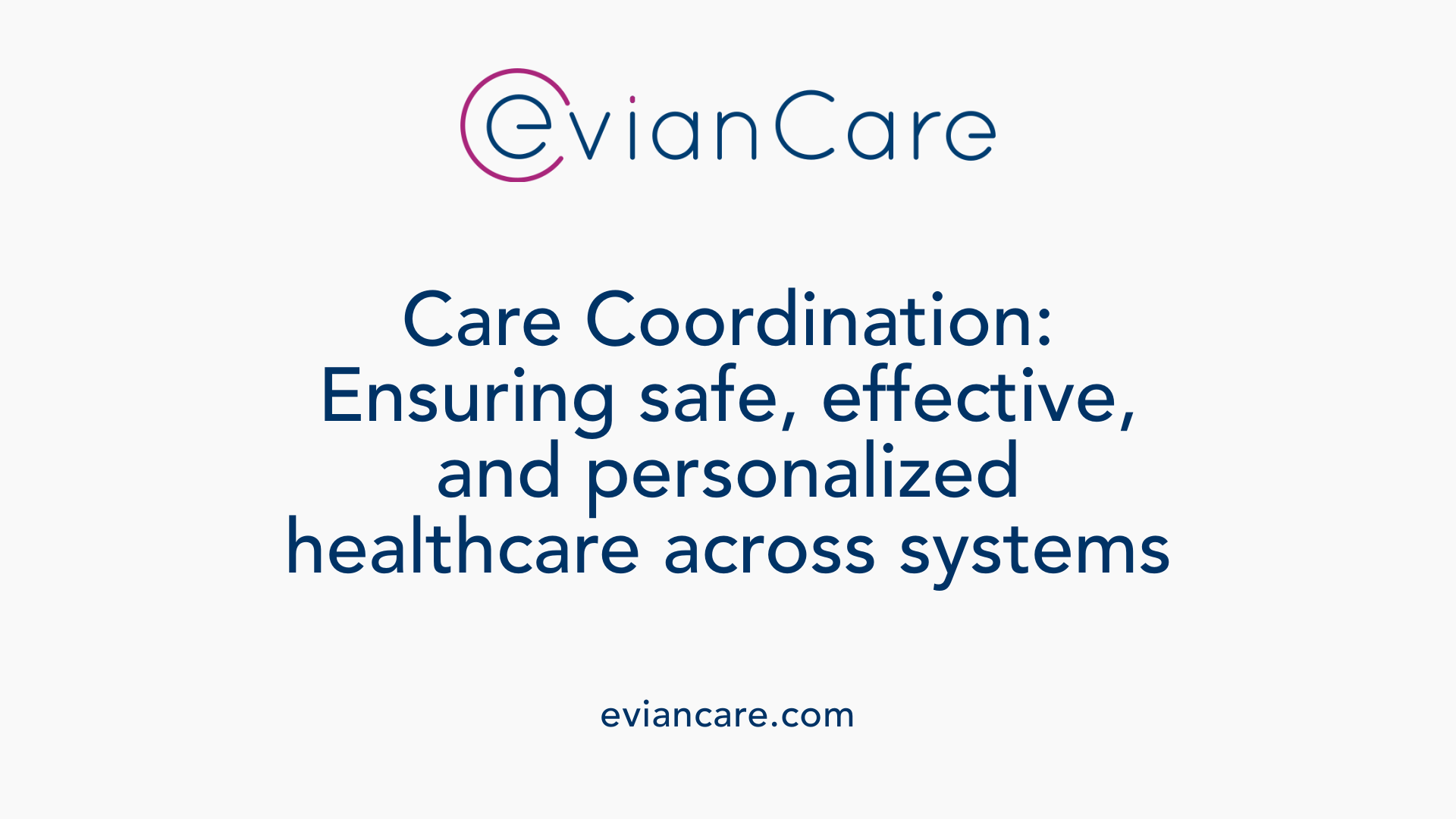
Understanding the Role of DDD in Medical Care Coordination
The Division of Developmental Disabilities (DDD) plays a pivotal role in managing, coordinating, and optimizing medical and social services for individuals with disabilities. This article explores how DDD leverages care coordination strategies, supported by policies and frameworks, to improve health outcomes for people with intellectual and developmental disabilities (IDD), ensuring they receive comprehensive, person-centered care throughout their lives.
Defining Developmental Disabilities and Their Lifelong Impact

What are developmental disabilities and how do they impact individuals throughout their lifetime?
Develop mental disabilities are a broad group of conditions characterized by lifelong impairments in physical, learning, language, or behavioral development. These conditions often originate before birth, influenced by genetic factors, maternal health, or environmental exposures during pregnancy. Some disabilities may also develop after birth due to injury, illness, or other environmental factors.
Individuals with developmental disabilities may face challenges in various aspects of daily life, including communication, mobility, self-care, and social interactions. They often experience delays or differences in reaching key developmental milestones such as walking, talking, or independent living skills.
These disabilities can lead to secondary health conditions and contribute to disparities in healthcare access and quality. Many individuals with developmental disabilities encounter social and health inequities, which can affect their overall well-being.
Early diagnosis and supportive interventions, including inclusive healthcare, are vital. By providing tailored services and accommodations, society can enhance the quality of life, foster independence, and promote social participation for individuals with developmental disabilities across their lifespan.
The Importance of Care Coordination in Healthcare Provision

What is care coordination in healthcare settings?
Care coordination in healthcare settings is a fundamental aspect of providing high-quality, patient-centered care. It involves organizing and synchronizing patient care activities and sharing relevant health information among all healthcare providers involved in a person's care. The goal is to ensure that each individual receives safe, appropriate, and effective treatment that aligns with their unique needs and preferences.
In practice, this means seamless communication across various caregivers, specialists, and support services. It helps prevent redundant procedures, reduces medical errors, and promotes timely interventions. The Agency for Healthcare Research and Quality (AHRQ) highlights care coordination as a crucial strategy to enhance healthcare quality and safety. They offer numerous resources, including research findings, evidence-based practices, and tools that support providers in improving collaboration.
Effective care coordination is especially vital for individuals with complex or chronic conditions, such as those with intellectual and developmental disabilities (IDD). For these populations, well-organized care ensures continuous support, reduces disparities, and fosters better health outcomes. Overall, the process hinges on strong teamwork, clear communication, and creating a cohesive system that adapts to each patient's evolving needs.
This approach not only benefits individuals by providing personalized care but also streamlines healthcare operations. It facilitates better transitions between different care settings, like moving from pediatric to adult care or from hospital to home. Ultimately, by emphasizing coordinated efforts, healthcare systems can deliver safer, more efficient, and more compassionate care for everyone.
The Unique Role of DDD in Supporting Care Coordination for the Disabled

What is the role of a care coordinator for individuals with intellectual and developmental disabilities?
An IDD care coordinator's role is to ensure that individuals with intellectual and developmental disabilities receive care in the best possible manner. These professionals work closely with individuals, families, and healthcare providers to develop, monitor, and adjust personalized service plans. They facilitate effective communication among diverse care providers, help navigate complex healthcare and social service systems, and advocate for the needs of the individual. Their responsibilities include coordinating assessments, linking individuals to suitable services, supporting transitions between different care settings, and ensuring that all services are delivered timely and effectively. By doing so, they help improve health outcomes, reduce hospitalizations, and promote independence.
What is the function of agencies like the Division of Developmental Disabilities (DDD) in managing services for people with disabilities?
The Division of Developmental Disabilities (DDD) plays a vital role in managing and providing services for individuals with developmental disabilities, including autism, cerebral palsy, epilepsy, Down syndrome, and cognitive impairments. The agency supports over 59,000 people and their families by offering a variety of programs and resources designed to foster self-direction, independence, and community involvement.
DDD evaluates each individual's eligibility based on specific criteria such as age, diagnosis, developmental delays, and the severity of daily living limitations. Once eligible, individuals can access tailored support services that help them achieve their personal goals. DDD is committed to respecting the rights of individuals and ensures nondiscrimination by adhering to civil rights laws and providing clear information and assistance to families.
The agency emphasizes community integration, offering services that span from residential options to employment support. It supports the transition of individuals from residential centers to community living, promoting independence while maintaining safety and well-being. Overall, DDD’s function is to empower individuals by coordinating a comprehensive range of services that help them lead healthier, more fulfilling lives in their communities.
| Aspect | Description | Additional Details |
|---|---|---|
| Eligibility | Based on age, diagnosis, and functional limitations | Ensures that services reach those with significant needs |
| Service Management | Offers residential, employment, and health supports | Tailored to individual needs and goals |
| Advocacy | Protects rights and promotes nondiscrimination | Ensures fair and equitable access to resources |
| Transition Support | Guides movement from institutional to community living | Focus on independence and integration |
This integrated system of care coordination and service management is essential for bridging gaps, optimizing resource use, and improving the quality of life for people with disabilities.
Impact of Policies, Support Systems, and Frameworks on Care Delivery
 Various policies, programs, and frameworks are established to improve healthcare delivery for individuals with intellectual and developmental disabilities (IDD). The Division of Developmental Disabilities (DDD) in New Jersey and the Illinois Department of Human Services (DHS) are key agencies overseeing services that promote community integration and independence.
Various policies, programs, and frameworks are established to improve healthcare delivery for individuals with intellectual and developmental disabilities (IDD). The Division of Developmental Disabilities (DDD) in New Jersey and the Illinois Department of Human Services (DHS) are key agencies overseeing services that promote community integration and independence.
Support systems like Support Coordination agencies help develop personalized service plans, enabling individuals to access suitable services, connect to resources, and transition smoothly between care settings. These agencies work closely with families and healthcare providers, ensuring ongoing monitoring and advocacy.
Frameworks such as the Patient's Medical Home facilitate comprehensive primary care, integrating medical, social, and community supports. This holistic approach emphasizes seamless transitions and person-centered planning, which are crucial for managing complex needs.
Together, these policies and support systems aim to close gaps in healthcare, improve coordination, and enhance health outcomes for people with IDD. They foster collaboration among providers, caregivers, and support organizations, ensuring that individuals receive focused and timely care tailored to their unique needs.
Harnessing Technology and Person-Centered Planning to Improve Outcomes

What are the methodologies of care coordination, including health information exchange (HIE), electronic health records, and transitional planning?
Care coordination for individuals with intellectual and developmental disabilities (IDD) relies on several technological and strategic methods to ensure seamless and effective support. One fundamental approach is Health Information Exchange (HIE), which involves documenting, collecting, and sharing a patient's health information across multiple providers. This ensures that everyone involved in a person's care has access to up-to-date data, reducing redundancies and enhancing decision-making.
Electronic health records (EHRs) are vital tools within HIE frameworks. They allow healthcare providers to store and access comprehensive health data electronically, facilitating quick, accurate sharing of information. Tools like handheld health records further support personal and caregiver involvement by providing accessible, portable health data.
Transitional planning is another important methodology, especially when individuals move between care settings such as from pediatric to adult care or school to community services. Effective transition planning ensures that support is continuous, well-coordinated, and tailored to individual needs. Using structured planning resources like transition templates and person-centered approaches helps create a smooth progression.
Together, these methodologies—HIE, EHRs, and transitional planning—form a robust foundation that enhances communication, fosters collaboration among healthcare teams, and ultimately improves health outcomes for individuals with IDD.
Towards a Holistic and Person-Centered Care Framework
In conclusion, effective care coordination, facilitated by agencies like DDD and supported by comprehensive policies, innovative technology, and person-centered frameworks, is essential for improving health and social outcomes for individuals with disabilities. By bridging gaps in healthcare delivery and fostering collaborative, interdisciplinary approaches, we can ensure that individuals with intellectual and developmental disabilities lead healthier, more autonomous lives.
References
- Circles of care for people with intellectual and ...
- Care Communication Toolkit
- Circles of care for people with intellectual and ...
- Health Care Coordination for Persons with Disabilities: Its ...
- Care coordination for children with a disability or ...
- Care Coordination
- Support Coordination (Care Management) - NJ.gov
- Care Coordination
- A Quick Guide for Families - NJ.gov












